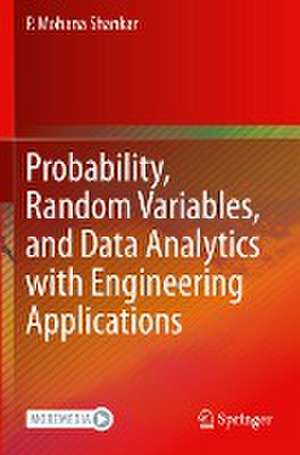Probability, Random Variables, and Data Analytics with Engineering Applications
Autor P. Mohana Shankaren Limba Engleză Paperback – 9 feb 2022
- Bridges the gap between conceptual topics and data analytics through appropriate examples and exercises;
- Features 100's of exercises comprising of traditional analytical ones and others based on data sets relevant to machine vision, machine learning and medical diagnostics;
- Intersperses analytical approaches with computational ones, providing two-level verifications of a majority of examples and exercises.
| Toate formatele și edițiile | Preț | Express |
|---|---|---|
| Paperback (1) | 539.16 lei 43-57 zile | |
| Springer International Publishing – 9 feb 2022 | 539.16 lei 43-57 zile | |
| Hardback (1) | 713.98 lei 43-57 zile | |
| Springer International Publishing – 9 feb 2021 | 713.98 lei 43-57 zile |
Preț: 539.16 lei
Preț vechi: 634.31 lei
-15% Nou
Puncte Express: 809
Preț estimativ în valută:
103.17€ • 107.99$ • 85.87£
103.17€ • 107.99$ • 85.87£
Carte tipărită la comandă
Livrare economică 31 martie-14 aprilie
Preluare comenzi: 021 569.72.76
Specificații
ISBN-13: 9783030562618
ISBN-10: 3030562611
Pagini: 473
Ilustrații: XII, 473 p. 206 illus., 202 illus. in color.
Dimensiuni: 155 x 235 mm
Greutate: 0.74 kg
Ediția:1st ed. 2021
Editura: Springer International Publishing
Colecția Springer
Locul publicării:Cham, Switzerland
ISBN-10: 3030562611
Pagini: 473
Ilustrații: XII, 473 p. 206 illus., 202 illus. in color.
Dimensiuni: 155 x 235 mm
Greutate: 0.74 kg
Ediția:1st ed. 2021
Editura: Springer International Publishing
Colecția Springer
Locul publicării:Cham, Switzerland
Cuprins
Chapter 1. Introduction.- Chapter 2. Sets, Venn diagrams, Probability and Bayes’ Rule.- Chapter 3. Concept of a random variable.- Chapter 4. Multiple random variables and their Characteristics.- Chapter 5. Applications to Data Analytics and Modeling.
Notă biografică
Dr. P. Mohana Shankar received his PhD from the Indian Institute of Technology, Delhi in Electrical Engineering in 1980. He joined Drexel in 1982 and since 2001, he has been the Allen Rothwarf Professor in the Department of Electrical and Computer Engineering at Drexel University. He is also an Adjunct Professor at Thomas Jefferson University in Philadelphia since 1998. He has held several positions at Drexel including Interim Department Head, Electrical Engineering; Director, Graduate Programs, College of Engineering, and Program Director, Telecommunications Engineering. He was the recipient of the 2005-2006 Christian R. and Mary F. Lindback Foundation Award for Distinguished Teaching and the 21018-2019 University Award for Pedagogy and Assessment. He developed several courses and laboratories in fiber optics, wireless communications, probability, etc. . He has taught numerous courses at both the graduate and undergraduate level. He has published several books, including two at Springer and published several papers in journals and conference proceedings in the areas of fiber sensors, wireless communications, ultrasonic imaging, ultrasonic nondestructive testing, ultrasonic contrast agents, ultrasonic tissue characterization and pedagogy. During the past few years, he has published extensively in pedagogy devoted to the use of computations tools in undergraduate engineering courses in differential equations, linear algebra, wireless, probability and data analytics.
Textul de pe ultima copertă
This book bridges the gap between theory and applications that currently exist in undergraduate engineering probability textbooks. It offers examples and exercises using data (sets) in addition to traditional analytical and conceptual ones. Conceptual topics such as one and two random variables, transformations, etc. are presented with a focus on applications. Data analytics related portions of the book offer detailed coverage of receiver operating characteristics curves, parametric and nonparametric hypothesis testing, bootstrapping, performance analysis of machine vision and clinical diagnostic systems, and so on. With Excel spreadsheets of data provided, the book offers a balanced mix of traditional topics and data analytics expanding the scope, diversity, and applications of engineering probability. This makes the contents of the book relevant to current and future applications students are likely to encounter in their endeavors after completion of their studies. A full suite ofclassroom material is included. A solutions manual is available for instructors.
- Bridges the gap between conceptual topics and data analytics through appropriate examples and exercises;
- Features 100's of exercises comprising of traditional analytical ones and others based on data sets relevant to machine vision, machine learning and medical diagnostics;
- Intersperses analytical approaches with computational ones, providing two-level verifications of a majority of examples and exercises.
Caracteristici
Bridges the gap between conceptual topics and data analytics through appropriate examples and exercises Features 100’s of exercises comprising of traditional analytical ones and others based on data sets relevant to machine vision, machine learning and medical diagnostics Intersperses analytical approaches with computational ones, providing two-level verifications of a majority examples and exercises
